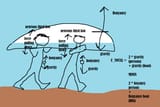>>212765014
Water in a container does have weight, and it doesn’t lose it just because it's not in a "solid" container. When you fill a bucket with a liter of water, that water has mass, and therefore weight. For reference, 1 liter of water weighs about 1 kilogram (under normal conditions at sea level). So, just because you're not holding the water directly doesn't mean it's weightless.
The argument that "you can’t pick up the water directly" is misleading. You can’t pick up the water without the container (unless you use your hands to scoop it up, like with a cup). The weight of the water is the same as the weight of the water in the bucket, they’re the same thing, just in a different state. The mass doesn’t disappear when you take it out of the container.
The comparison between water and air doesn’t hold up. Air is a gas, and gases are generally lighter and harder to "grab" in the same way that liquids like water are. But air still has mass, and you can measure it (weigh it in controlled environments). It may seem "weightless" because it disperses so easily, but that doesn’t mean it has no weight. For instance, 1 cubic meter of air at sea level weighs about 1.2 kilograms.
Fish don't breathe air, they breathe dissolved oxygen in the water, which is a totally different thing from the air that humans breathe. The "weightless" claim about water is especially strange in this context, because water itself is the medium that holds the oxygen for fish.
If you were to pour water out of a container and attempt to “hold” the water without the container, you’d find that it would spill and run through your fingers. That’s not because water is weightless, it’s because the container is holding it in place. In a practical sense, the weight of the water remains the same whether you’re holding it in your hands or whether it's in a container.









































